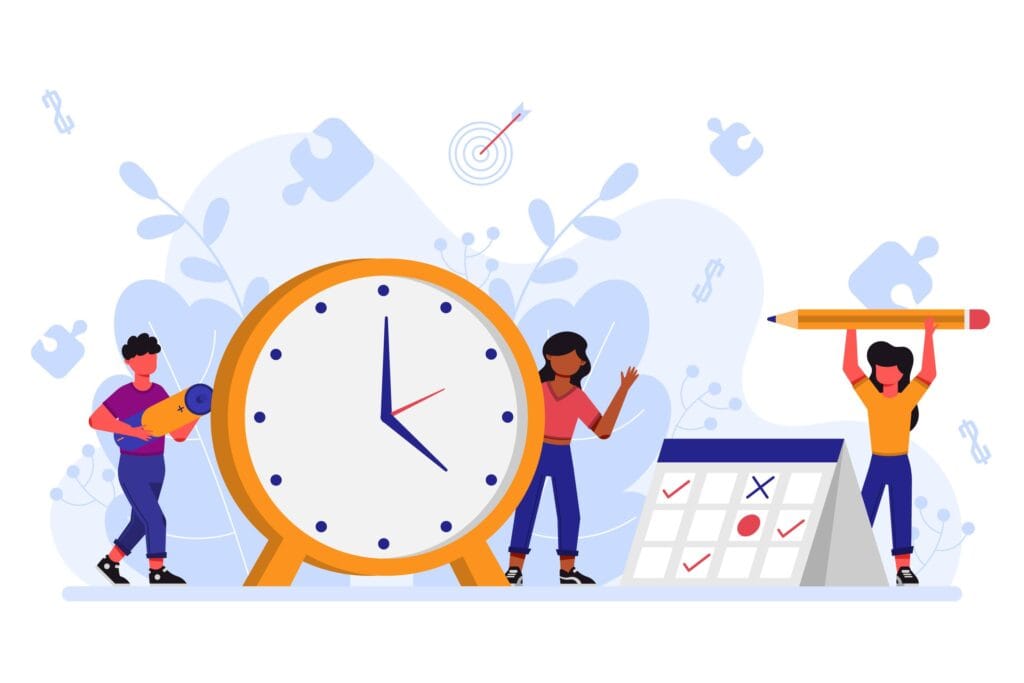Time Management Tips for Freelancers
Introduction
Time management is the cornerstone of successful freelancing. Without a boss looking over your shoulder or a set schedule to adhere to, the freedom can quickly turn into chaos. So how do you make the most of your time and keep your freelance career on track? This article is your guide to mastering time management as a freelancer.
Table of Contents
Understanding Time Management
What is Time Management?
Time management involves planning and controlling how much time to spend on specific activities. Good time management enables an individual to complete more in a shorter period, lowers stress, and leads to career success.

Why is Time Management Crucial for Freelancers?
For freelancers, time is money. Efficient time management allows freelancers to juggle multiple clients, meet deadlines, and ensure a steady flow of income without burning out.
Setting Clear Goals
Importance of Goal Setting
Setting clear goals gives direction and purpose. It transforms vague ambitions into actionable tasks, providing a roadmap for your freelance career.
How to Set SMART Goals
SMART goals are Specific, Measurable, Achievable, Relevant, and Time-bound. For example, instead of saying, “I want to earn more money,” a SMART goal would be, “I want to earn $5,000 per month within six months by acquiring three new clients.”
Prioritizing Tasks
The Eisenhower Matrix
The Eisenhower Matrix helps prioritize tasks by urgency and importance, categorizing them into four quadrants:
- Urgent and Important
- Important but Not Urgent
- Urgent but Not Important
- Neither Urgent nor Important
ABCDE Method
The ABCDE method involves categorizing tasks:
- A: Must do – serious consequences if not done.
- B: Should do – mild consequences if not done.
- C: Nice to do – no consequences if not done.
- D: Delegate – tasks others can do.
- E: Eliminate – tasks that don’t matter.
Creating a Daily Schedule
Benefits of a Daily Schedule
A daily schedule helps manage time effectively, ensuring that essential tasks are completed. It reduces stress and enhances productivity by providing a clear plan of action.
Tools for Scheduling
Tools like Google Calendar, Trello, and Asana help organize tasks, set deadlines, and allocate time effectively. These tools provide reminders and allow for easy adjustments.
Using Time-Tracking Tools
Popular Time-Tracking Tools
Tools like Toggl, Clockify, and Harvest are popular among freelancers. They track how much time is spent on each task, providing insights into productivity patterns.
How to Choose the Right Tool
Choose a tool that integrates with your existing systems, has a user-friendly interface, and provides detailed reports. Consider trying a few options to see which one fits your workflow best.
Avoiding Multitasking
The Myth of Multitasking
Multitasking reduces productivity and increases errors. It’s a myth that doing several things at once is more efficient. Focus on one task at a time for better results.
Strategies to Stay Focused
Techniques like the Pomodoro Technique, where you work for 25 minutes and then take a 5-minute break, can help maintain focus. Removing distractions and setting specific work times also aid concentration.
Taking Regular Breaks
The Pomodoro Technique
The Pomodoro Technique breaks work into intervals, typically 25 minutes of work followed by a 5-minute break. This method can boost productivity and keep you fresh throughout the day.
Importance of Breaks for Productivity
Regular breaks prevent burnout and improve overall productivity. They allow for mental rest, reducing stress and maintaining high levels of performance.
Delegating Tasks
Identifying Tasks to Delegate
Identify tasks that are repetitive or that others can do more efficiently. Delegating these tasks frees up time for more critical activities that require your expertise.
Finding the Right People to Delegate To
Look for reliable freelancers or services to delegate tasks to. Websites like Upwork, Fiverr, and Freelancer can help find qualified individuals.
Setting Boundaries
Importance of Boundaries in Freelancing
Setting boundaries helps maintain a work-life balance and prevents burnout. It ensures that work doesn’t spill over into personal time.
How to Set and Maintain Boundaries
Communicate your working hours to clients and stick to them. Use separate devices for work and personal use if possible, and avoid checking work emails during off-hours.
Managing Distractions
Common Distractions for Freelancers
Common distractions include social media, household chores, and unexpected interruptions. These can significantly impact productivity if not managed properly.
Techniques to Minimize Distractions
Create a dedicated workspace, use apps to block distracting websites, and set specific times for checking emails and messages. Let family and friends know your work schedule to minimize interruptions.
Balancing Work and Personal Life
The Importance of Work-Life Balance
A healthy work-life balance is crucial for long-term success and well-being. It prevents burnout and ensures that personal relationships and health are not neglected.
Tips for Achieving Balance
Set clear work hours, take regular breaks, and make time for hobbies and social activities. Prioritize tasks and delegate when possible to maintain a balanced lifestyle.
Reviewing and Adjusting Plans
Regular Review of Goals and Progress
Regularly reviewing your goals and progress helps identify areas for improvement. It ensures that you stay on track and make necessary adjustments to your plans.
Adjusting Plans for Better Efficiency
Be flexible and open to change. If a particular strategy isn’t working, don’t be afraid to adjust it. Continuous improvement is key to effective time management.
Staying Motivated
Ways to Stay Motivated
Set small, achievable goals and reward yourself upon completion. Surround yourself with positive influences and take breaks to recharge. Stay connected with other freelancers for support and motivation.
Overcoming Procrastination
Break tasks into smaller, manageable parts. Use techniques like the two-minute rule: if a task takes two minutes or less, do it immediately. Set deadlines and hold yourself accountable.
Conclusion
Mastering time management is essential for any freelancer looking to thrive in their career. By setting clear goals, prioritizing tasks, creating a daily schedule, and using tools effectively, you can make the most of your time and achieve your freelance goals. Remember, it’s not about working harder but working smarter.
FAQs
- What are the best time management tools for freelancers?
Popular tools include Toggl, Clockify, Google Calendar, Trello, and Asana. - How can I avoid distractions while working from home?
Create a dedicated workspace, use apps to block distracting websites, and set specific work hours. - Why is taking breaks important for productivity?
Regular breaks prevent burnout, reduce stress, and maintain high levels of performance. - How can I set and maintain boundaries with clients?
Communicate your working hours clearly and stick to them. Avoid checking work emails during off-hours. - What is the Pomodoro Technique?
The Pomodoro Technique involves working for 25 minutes and then taking a 5-minute break. It helps maintain focus and productivity.



